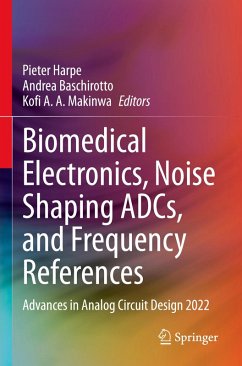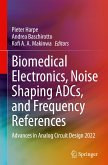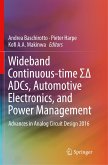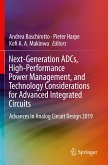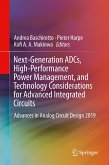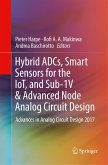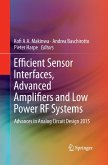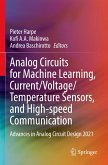Biomedical Electronics, Noise Shaping ADCs, and Frequency References
Advances in Analog Circuit Design 2022
Herausgegeben:Harpe, Pieter; Baschirotto, Andrea; Makinwa, Kofi A.A.
Biomedical Electronics, Noise Shaping ADCs, and Frequency References
Advances in Analog Circuit Design 2022
Herausgegeben:Harpe, Pieter; Baschirotto, Andrea; Makinwa, Kofi A.A.
- Broschiertes Buch
- Merkliste
- Auf die Merkliste
- Bewerten Bewerten
- Teilen
- Produkt teilen
- Produkterinnerung
- Produkterinnerung
This book is based on the 18 tutorials presented during the 30th workshop on Advances in Analog Circuit Design. Expert designers present readers with information about a variety of topics at the frontier of analog circuit design, with specific contributions focusing on analog circuits for machine learning, current/voltage/temperature sensors, and high-speed communication via wireless, wireline, or optical links. This book serves as a valuable reference to the state-of-the-art, for anyone involved in analog circuit research and development.
Andere Kunden interessierten sich auch für
![Biomedical Electronics, Noise Shaping ADCs, and Frequency References Biomedical Electronics, Noise Shaping ADCs, and Frequency References]() Biomedical Electronics, Noise Shaping ADCs, and Frequency References85,99 €
Biomedical Electronics, Noise Shaping ADCs, and Frequency References85,99 €![Wideband Continuous-time ¿¿ ADCs, Automotive Electronics, and Power Management Wideband Continuous-time ¿¿ ADCs, Automotive Electronics, and Power Management]() Wideband Continuous-time ¿¿ ADCs, Automotive Electronics, and Power Management77,99 €
Wideband Continuous-time ¿¿ ADCs, Automotive Electronics, and Power Management77,99 €![Next-Generation ADCs, High-Performance Power Management, and Technology Considerations for Advanced Integrated Circuits Next-Generation ADCs, High-Performance Power Management, and Technology Considerations for Advanced Integrated Circuits]() Next-Generation ADCs, High-Performance Power Management, and Technology Considerations for Advanced Integrated Circuits93,99 €
Next-Generation ADCs, High-Performance Power Management, and Technology Considerations for Advanced Integrated Circuits93,99 €![Next-Generation ADCs, High-Performance Power Management, and Technology Considerations for Advanced Integrated Circuits Next-Generation ADCs, High-Performance Power Management, and Technology Considerations for Advanced Integrated Circuits]() Next-Generation ADCs, High-Performance Power Management, and Technology Considerations for Advanced Integrated Circuits93,99 €
Next-Generation ADCs, High-Performance Power Management, and Technology Considerations for Advanced Integrated Circuits93,99 €![Hybrid ADCs, Smart Sensors for the IoT, and Sub-1V & Advanced Node Analog Circuit Design Hybrid ADCs, Smart Sensors for the IoT, and Sub-1V & Advanced Node Analog Circuit Design]() Hybrid ADCs, Smart Sensors for the IoT, and Sub-1V & Advanced Node Analog Circuit Design123,99 €
Hybrid ADCs, Smart Sensors for the IoT, and Sub-1V & Advanced Node Analog Circuit Design123,99 €![Efficient Sensor Interfaces, Advanced Amplifiers and Low Power RF Systems Efficient Sensor Interfaces, Advanced Amplifiers and Low Power RF Systems]() Efficient Sensor Interfaces, Advanced Amplifiers and Low Power RF Systems77,99 €
Efficient Sensor Interfaces, Advanced Amplifiers and Low Power RF Systems77,99 €![Analog Circuits for Machine Learning, Current/Voltage/Temperature Sensors, and High-speed Communication Analog Circuits for Machine Learning, Current/Voltage/Temperature Sensors, and High-speed Communication]() Analog Circuits for Machine Learning, Current/Voltage/Temperature Sensors, and High-speed Communication93,99 €
Analog Circuits for Machine Learning, Current/Voltage/Temperature Sensors, and High-speed Communication93,99 €-
-
-
This book is based on the 18 tutorials presented during the 30th workshop on Advances in Analog Circuit Design. Expert designers present readers with information about a variety of topics at the frontier of analog circuit design, with specific contributions focusing on analog circuits for machine learning, current/voltage/temperature sensors, and high-speed communication via wireless, wireline, or optical links. This book serves as a valuable reference to the state-of-the-art, for anyone involved in analog circuit research and development.
Produktdetails
- Produktdetails
- Verlag: Springer / Springer International Publishing / Springer, Berlin
- Artikelnr. des Verlages: 978-3-031-28914-9
- 2023
- Seitenzahl: 356
- Erscheinungstermin: 23. Juni 2024
- Englisch
- Abmessung: 235mm x 155mm x 20mm
- Gewicht: 540g
- ISBN-13: 9783031289149
- ISBN-10: 3031289145
- Artikelnr.: 71164645
- Herstellerkennzeichnung Die Herstellerinformationen sind derzeit nicht verfügbar.
- Verlag: Springer / Springer International Publishing / Springer, Berlin
- Artikelnr. des Verlages: 978-3-031-28914-9
- 2023
- Seitenzahl: 356
- Erscheinungstermin: 23. Juni 2024
- Englisch
- Abmessung: 235mm x 155mm x 20mm
- Gewicht: 540g
- ISBN-13: 9783031289149
- ISBN-10: 3031289145
- Artikelnr.: 71164645
- Herstellerkennzeichnung Die Herstellerinformationen sind derzeit nicht verfügbar.
Pieter Harpe received the M.Sc. and Ph.D. degrees from the Eindhoven University of Technology, The Netherlands, in 2004 and 2010, respectively. In 2008, he became a researcher at Holst Centre / imec, The Netherlands. Since then, he has been working on ultra low-power wireless transceivers, with a main focus on ADC research and design. In April 2011, he joined Eindhoven University of Technology where he is currently an Associate Professor on low-power mixed-signal circuits. Dr. Harpe is co-organizer of the yearly workshop on Advances in Analog Circuit Design (AACD), analog subcommittee chair for the ESSCIRC conference, and TPC member for the A-SSCC. He also served as ISSCC ITPC member, IEEE SSCS Distinguished Lecturer, and guest editor of the IEEE Journal of Solid-State Circuits. He is a Senior Member of the IEEE and recipient of the ISSCC 2015 Distinguished Technical Paper Award. Kofi Makinwa holds degrees from Obafemi Awolowo University, Ile-Ife (B.Sc., M.Sc.), Philips International Institute, Eindhoven (M.E.E.), and Delft University of Technology, Delft (Ph.D.). From 1989 to 1999, he was a research scientist at Philips Research Laboratories, Eindhoven. He then joined Delft University of Technology, where he is currently a full professor and the head of the Microelectronics department. His main research interests are in the design of analog circuits and sensor interfaces. This has led to 17 books, 300+ publications and 30+ patents. He is the co-recipient of 17 best paper awards, from the Journal of Solid-State Circuits (JSSC) and the International Solid-State Circuits Conference (ISSCC), among others, and is an ISSCC top-10 contributor. Dr. Makinwa was the Analog subcommittee chair of ISSCC and has served on the program committees of several other IEEE conferences. He also served the Solid-State Circuits Society as a distinguished lecturer and as a member of the Adcom. He is a co-organizer of the Advances in Analog Circuit Design workshop (AACD) and the Sensor Interfaces Meeting (SIM). He is an IEEE Fellow and a member of the Royal Netherlands Academy of Arts and Sciences. Andrea Baschirotto graduated in Electronic Engineering (summa cum laude) from the University of Pavia in 1989. In 1994, he received the Ph.D. degree in electronics engineering from the University of Pavia. In 1994, he joined the Department of Electronics, University of Pavia, as a Researcher (Assistant Professor). In 1998, he joined the Department of Innovation Engineering, University of Lecce, Italy, as an Associate Professor. In 2007, he joined the Department of Physics, University of Milan-Bicocca, Italy, as an Associate Professor.
Part I Introduction.- Chapter 1.- Overview of Design Challenges in High-Performance Exg Interfaces.- Chapter 2.- VCO-based ADCs for direct digitization of ExG signals.- Chapter 3.- Circuits and Architectures for Neural Recording Interfaces.- Chapter 4.- Chip-integrated spin detection for Biomedical applications.- Chapter 5.- Models and Interfaces for Electrochemical Sensors: Architectures and Implementations.- Chapter 6.- Next-generation molecular detection With a CMOS-capacitive sensor.- Part II.- Noise Shaping ADCs.- Chapter 7.- The Evolution of Noise-Shaping Successive Approximation (SAR) ADC.- Chapter 8.- Noise Shaped SAR ADCs Current trends and challenges.- Chapter 9.- Noise-Shaping SAR ADCS: From Discrete Time to Continuous Time.- Chapter 11.- Pushing the Limits of kT/C Noise in Delta-Sigma Modulators.- Chapter 12.- A 2nd Order 5bit hybrid CT/DT Delta-Sigma ADC implementing novel techniques for ELD compensation and coefficients trimming.- Part III.- Frequency References.- Chapter 13.- RC Frequency References based on Dual-RC FLLs.- Chapter 14.- RC Oscillators with Non-linear Temperature Compensation.- Chapter 15.- RC frequency references based on pulse-density trimmed resistors.- Chapter 16.- Integrated BAW-based frequency references.- Chapter 17.- Fast Startup and Fully Differential Crystal Oscillator.- Chapter 18.- Fast startup and fully differential crystal oscillator.
Part I Introduction.- Chapter 1.- Overview of Design Challenges in High-Performance Exg Interfaces.- Chapter 2.- VCO-based ADCs for direct digitization of ExG signals.- Chapter 3.- Circuits and Architectures for Neural Recording Interfaces.- Chapter 4.- Chip-integrated spin detection for Biomedical applications.- Chapter 5.- Models and Interfaces for Electrochemical Sensors: Architectures and Implementations.- Chapter 6.- Next-generation molecular detection With a CMOS-capacitive sensor.- Part II.- Noise Shaping ADCs.- Chapter 7.- The Evolution of Noise-Shaping Successive Approximation (SAR) ADC.- Chapter 8.- Noise Shaped SAR ADCs Current trends and challenges.- Chapter 9.- Noise-Shaping SAR ADCS: From Discrete Time to Continuous Time.- Chapter 11.- Pushing the Limits of kT/C Noise in Delta-Sigma Modulators.- Chapter 12.- A 2nd Order 5bit hybrid CT/DT Delta-Sigma ADC implementing novel techniques for ELD compensation and coefficients trimming.- Part III.- Frequency References.- Chapter 13.- RC Frequency References based on Dual-RC FLLs.- Chapter 14.- RC Oscillators with Non-linear Temperature Compensation.- Chapter 15.- RC frequency references based on pulse-density trimmed resistors.- Chapter 16.- Integrated BAW-based frequency references.- Chapter 17.- Fast Startup and Fully Differential Crystal Oscillator.- Chapter 18.- Fast startup and fully differential crystal oscillator.

